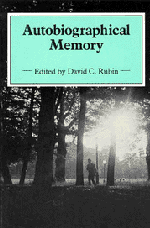Book contents
- Frontmatter
- Contents
- List of contributors
- Preface
- Part I Overview
- Part II Historical, theoretical, and methodological contexts for the study of autobiographical memory
- Part III The general organization of autobiographical memory
- 5 Nested structure in autobiographical memory
- 6 Schematization of autobiographical memory
- 7 Strategic memory search processes
- 8 Autobiographical memory: a developmental perspective
- Part IV The temporal organization of autobiographical memory
- Part V Temporal distributions of autobiographical memories
- Part VI Failures of autobiographical memory
- Author index
- Subject index
6 - Schematization of autobiographical memory
Published online by Cambridge University Press: 01 March 2011
- Frontmatter
- Contents
- List of contributors
- Preface
- Part I Overview
- Part II Historical, theoretical, and methodological contexts for the study of autobiographical memory
- Part III The general organization of autobiographical memory
- 5 Nested structure in autobiographical memory
- 6 Schematization of autobiographical memory
- 7 Strategic memory search processes
- 8 Autobiographical memory: a developmental perspective
- Part IV The temporal organization of autobiographical memory
- Part V Temporal distributions of autobiographical memories
- Part VI Failures of autobiographical memory
- Author index
- Subject index
Summary
Introduction
The issues addressed in this chapter reflect concerns about the nature and acquisition of everyday autobiographical memories. One view is that such memories represent life events as those events actually happened; there is little change in what is remembered with the passage of time and as different experiences accumulate – most autobiographical memories have distinct, enduring, and episodic qualities (Tulving, 1972). I assume instead that (a) most autobiographical memories are reconstructions of past episodic events (Bartlett, 1932), (b) these recollections are driven by self-schemata (Markus, 1977), and (c) such self-schemata are acquired through a schematization process of one's memories for routine and often mundane everyday events and activities (Freud, 1914/1960; Piaget & Inhelder, 1973). If most autobiographical memories are reconstructions, then they are not often exact in detail even though these memories are true in the sense of maintaining the integrity and gist of past life events. Although many of the generic properties of one's autobiographical memories may change only gradually or with the occurrence of some socially significant transition, the elaborations of specific events probably vary over time, and those elaborations could be affected by one's current self-knowledge base.
- Type
- Chapter
- Information
- Autobiographical Memory , pp. 82 - 99Publisher: Cambridge University PressPrint publication year: 1986
- 59
- Cited by

